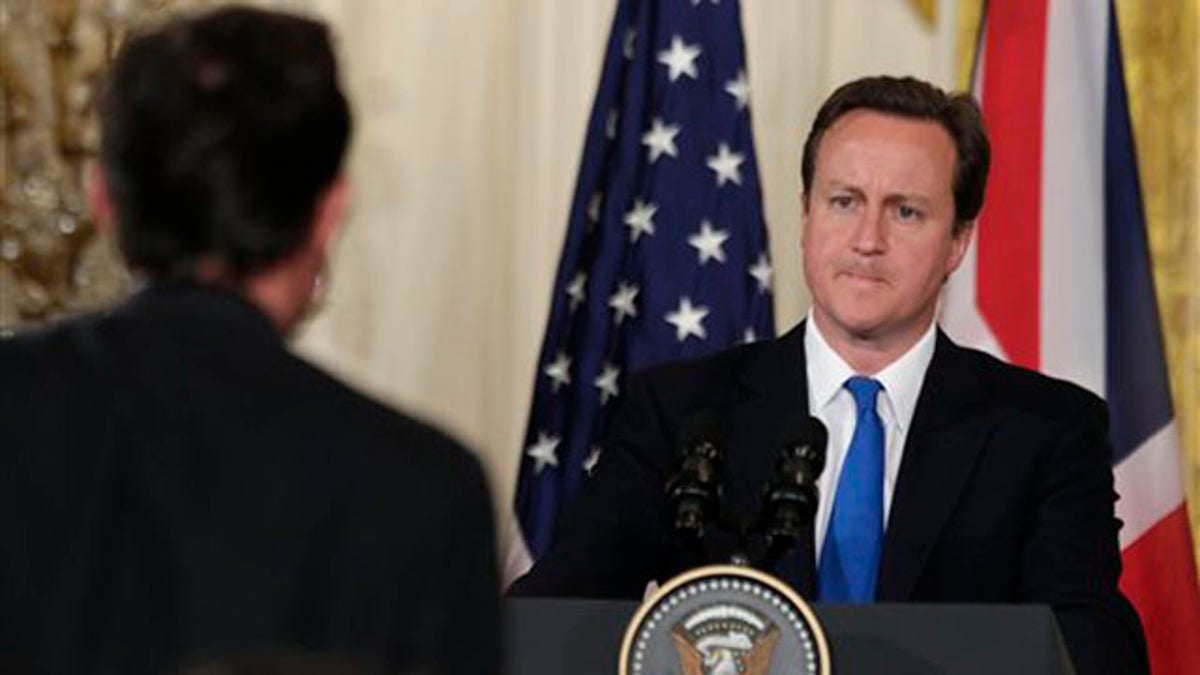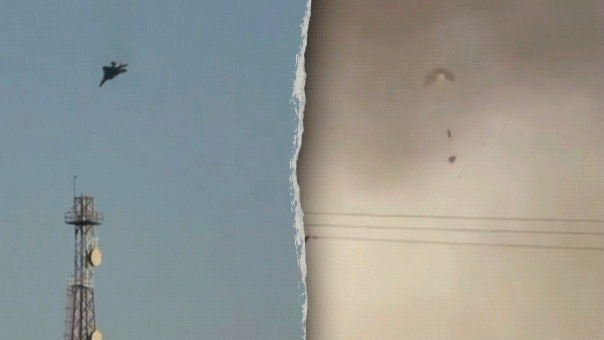
British Prime Minister David Cameron is seen at a news conference with President Obama, not shown, in the East Room of the White House July 20. (AP Photo)
British Prime Minister David Cameron is not taking "off the table" the option of a full investigation into the release of the Lockerbie bomber, Sen. Charles Schumer said, though Cameron repeatedly claimed he was opposed to the idea during a press conference Tuesday in Washington.
Schumer, D-N.Y., joined by Kirsten Gillibrand, D-N.Y., and Sens. Robert Menendez and Frank Lautenberg of New Jersey, met with Cameron Tuesday evening to discuss the Lockerbie issue, which has overshadowed a broader agenda that President Obama and Cameron discussed in the Oval Office before addressing reporters.
Schumer said in a brief, written statement that the meeting was "frank and serious."
"We urged the British government to pursue a complete and independent investigation, not simply a document review," he said. "The prime minister listened to our request and said that a full investigation was not off the table."
Menendez said the senators hope Cameron will "reflect" upon their request for the British government to open a full-scale probe, but did not say whether Cameron appeared open to the idea in light of their conversation.
During the press conference with Obama earlier Tuesday, Cameron turned aside U.S. calls for a fresh investigation into why the convicted Lockerbie bomber was set free by Scotland and whether BP had a role in the controversial decision.
In declaring his position -- to potentially make public more information from an earlier investigation of Libyan Abdel Baset al-Megrahi's release, but not start a new one -- Cameron politely but roundly rebuffed the U.S. government.
Obama stood by his new peer, but said that "all the facts" must come out. He said the U.S. would "welcome any additional information," and made clear he wanted it. Beyond the lingering anger, the case swirls anew with interest because of its possible links to BP, the British oil giant facing huge fallout in the United States for causing the massive Gulf of Mexico oil spill.
"I think all of us here in the United States were surprised, disappointed and angry about the release of the Lockerbie bomber," Obama said. Yet he added: "The key thing to understand here is that we've got a British prime minister who shares our anger over the decision. And so I'm fully supportive of Prime Minister Cameron's efforts to gain a better understanding of it."
Al-Megrahi was convicted for the 1988 bombing of a Pan Am jet over Lockerbie, Scotland, that killed 270 people, most of them American. The Scottish government released the cancer-stricken man on compassionate grounds last year, igniting outrage on both sides of the Atlantic.
Bringing the matter to the fore again are accusations that BP sought the release of the convicted bomber as part of efforts to seek access to Libyan oil fields; BP has acknowledged that it urged the British government to sign a prisoner transfer agreement with Libya, but says it never specified al-Megrahi's case.
"Any lobbying they might have done is an issue for BP, and an issue that they should explain themselves," Cameron said flatly.
The British leader said, though, that he has not seen anything to suggest that the Scottish government was swayed by BP.
The four U.S. senators asked the State Department last week to investigate whether BP lobbied the British government over al-Megrahi's release as part of efforts to seek access to Libyan oil fields.
Just ahead of Cameron's arrival in Washington, Secretary of State Hillary Clinton requested that the Scottish and British governments review exactly what happened in al-Megrahi's release. That seemed to go nowhere with Cameron, who said: "I don't think there's any great mystery here."
"There was a decision taken by the Scottish Executive -- in my view, a wholly wrong and misguided decision, a bad decision, but their decision, nonetheless," he said. "That's what happened, and I don't think we need an extra inquiry to tell us that that's what happened."
Even Obama said whatever information emerges will likely lead to the same conclusion: "It was a decision that should not have been made," he said.
Al-Megrahi served eight years of a life sentence. He was released and returned to Libya in August 2009 after doctors said he had only three months to live, but a doctor now says he could live for another decade.
Cameron did say that his government would cooperate with the inquiry being pursued by the U.S. Senate Foreign Relations Committee. And the matter shows little sign of quickly fading away as long as BP is in the mix. The British prime minister said that he and Obama discussed the company at length.
In front of reporters, Cameron was notably more defensive of the British company than Obama. Cameron said BP must be responsible for responding to the Gulf disaster it caused and compensating victims, but he also described BP's success as vital to the British and U.S. economies and to thousands of workers.
"Let us not confuse the oil spill with the Libyan bomber," Cameron said, a point he emphasized more than once.
Cameron was focusing on Afghanistan on Wednesday. He planned to lay a wreath at the Tomb of the Unknown Soldier at Arlington National Cemetery before heading to the Pentagon for briefings on military operations in Afghanistan.
Cameron was later scheduled to travel by train to New York to meet with senior U.S. business leaders about prospects for increased trade and investment with Britain. He also will hold talks with U.N. Secretary-General Ban Ki-moon and attend a dinner hosted by New York City Mayor Michael Bloomberg before flying back to Britain.
The Associated Press contributed to this report.











































